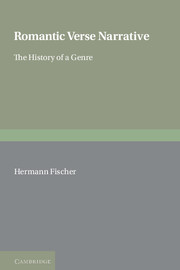Book contents
- Frontmatter
- Contents
- Preface
- List of abbreviations
- Dedication
- Introduction
- Part I The genre and it historical context
- Part II The history of the romantic tale in verse: poets, works, critics and the public
- 3 Early forms
- 4 The establishment of the genre by Sir Walter Scott, its fashionable period, and limitatins by other poets
- 5 ‘The postscript of the Augustans’ and the opposite of the romance
- 6 Ramification and dissolution
- 7 The subsequent fate of the genre
- Conclusion
- Notes
- Bibliography
5 - ‘The postscript of the Augustans’ and the opposite of the romance
Published online by Cambridge University Press: 27 March 2010
- Frontmatter
- Contents
- Preface
- List of abbreviations
- Dedication
- Introduction
- Part I The genre and it historical context
- Part II The history of the romantic tale in verse: poets, works, critics and the public
- 3 Early forms
- 4 The establishment of the genre by Sir Walter Scott, its fashionable period, and limitatins by other poets
- 5 ‘The postscript of the Augustans’ and the opposite of the romance
- 6 Ramification and dissolution
- 7 The subsequent fate of the genre
- Conclusion
- Notes
- Bibliography
Summary
In the field of aesthetics historic necessity, the ‘fury of extinction’ (Hegel) strictly forbids compromise of any kind.
T.W. Adorno, Philosophie der Neuen Musik, 1949, p. 3Thomas Campbell
Polished, worked up, touched and retouched into sweet and artificial beauty … simple – but insipid.
Blackwood's Magazine, 96, January 1825 (review of Campbell's TheodrIn 1809, when Campbell brought out his first tale in verse, Gertrude of Wyoming, he already had a significant reputation as a poet. He was Scotland's prince among poets until Scott took over from him with his Lay. Byron, however, still placed him among the top contemporary poets in his famous pyramid of poets, and even in 1829 Goethe considered him to be the most important modern British poet after Byron, although he also stressed that he (Goethe) did not feel at home with the newer English poetry. This fame was established by several lively ballads full of national spirit and empire sentiment and in particular by The Pleasures of Hope (1799), a reflective poem in pure neoclassical style, and a successor to Akenside's Pleasures of the Imagination (1744, 1757) and Rogers' Pleasures of Memory (1792) with echoes of Pope, Thomson, Cowper, Johnson and Goldsmith.
- Type
- Chapter
- Information
- Romantic Verse NarrativeThe History of a Genre, pp. 120 - 145Publisher: Cambridge University PressPrint publication year: 1991



